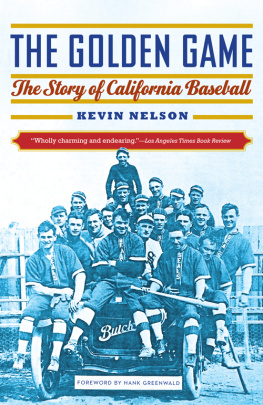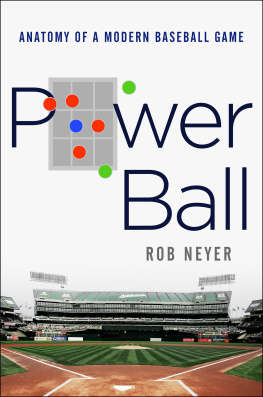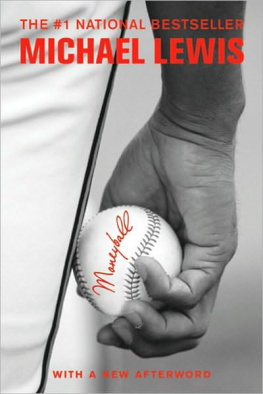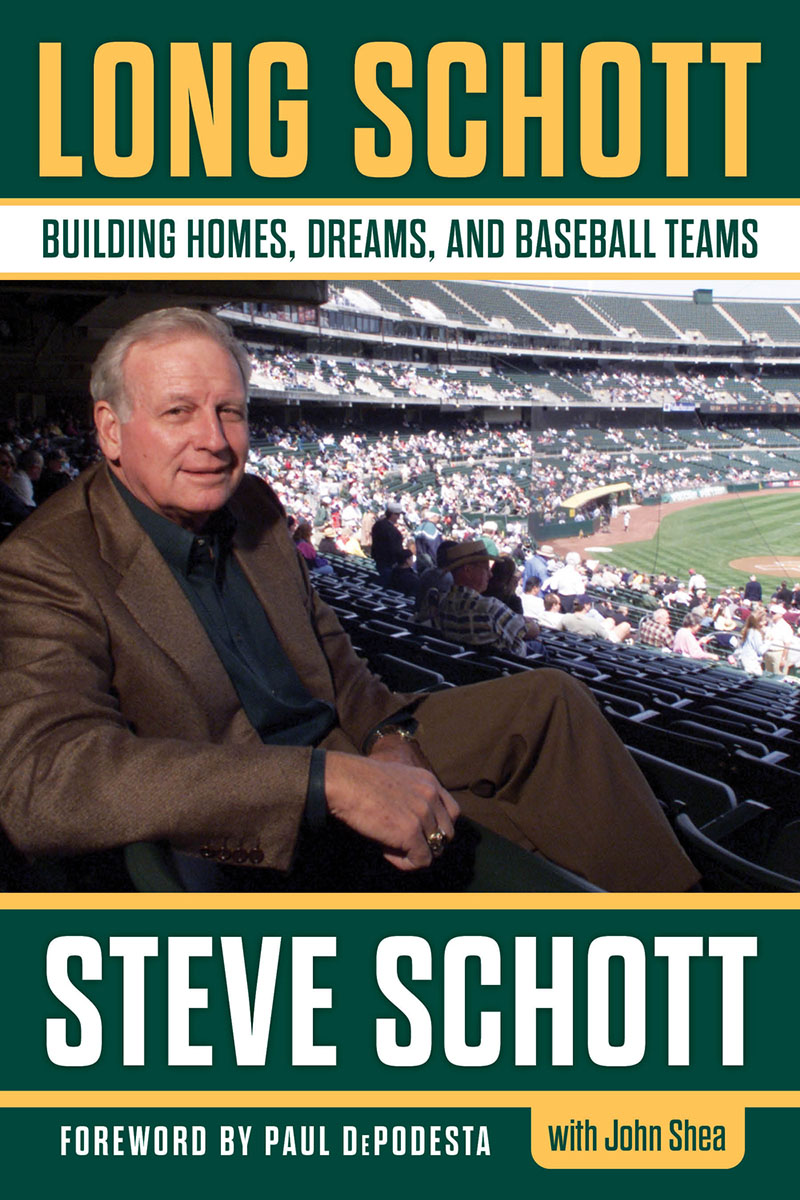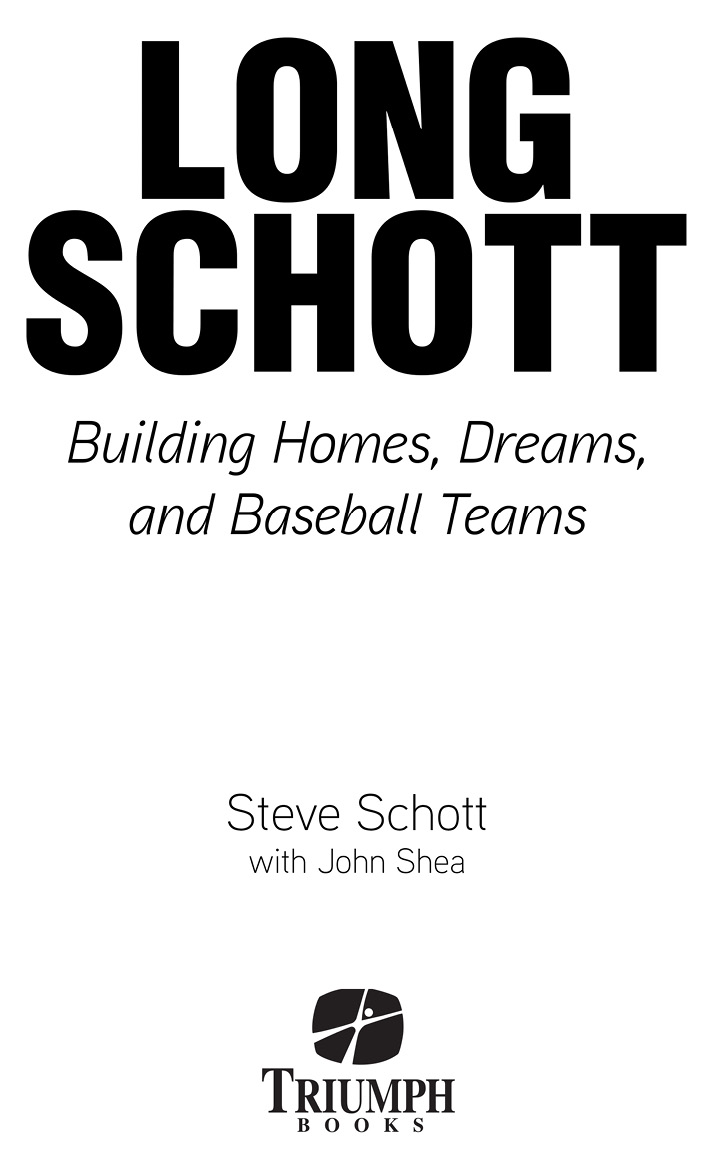
To my grandchildren, who will learn what it takes to find the road to success, happiness, and peace with God, themselves, and their families.
S.S.
In memory of Sam Spear, a great friend who helped initiate this project and whose generous and vibrant spirit will remain forever.
J.S.
Contents
Foreword by Paul DePodesta
When Billy Beane first offered me the assistant general manager job with the Oakland As, I didnt even think to ask for a chance to meet the ownership. I was so excited that it didnt cross my mind, but really, I had no idea how critical ownership was to any successful sports franchise.
All sports team owners want to win, and while nearly all of them wouldnt mind losing a few dollars to help make that happen, none of them enthusiastically lose millions without the accompanying ring. That makes life interesting for the general manager, as the best job security for a GM is winning games. So what do typical GMs want to do? Spend as much as possible to help them win. After all, its not their money. This creates a culture in which the GM is constantly asking ownership for more money, making the case that the extra spend will get them that much closer to the coveted championship. This dynamic prompted one MLB owner to proclaim that every organizations biggest enemy is his own general manager.
The Oakland As under Steve Schott were different. Yes, Steve wanted to win as badly as any other owner, even though our team didnt generate the same revenue as our competitors. However, he also was shrewd enough to know that if we tried to spend an extra $1 million on players to gain an edge, our competitors would react by spending $2 million. If we tried to spend an extra $5 million, they would just spend $10 million.
Steve imparted to us that this particular strategy is a foolish way to attempt to compete, whether with a baseball team or in any other venture, as you end up losing both on and off the field. That made a lasting impression on Billy and me, and I think thats still the way the As think about the world long after Steves ownership.
And rightfully so. Steve created a framework in Oakland that was the foundation for our success. First, he created our operating box, containing two goals: the first was to win as many games as possible, and the second was not to lose money. That wasnt necessarily a novel concept, but the clarity of the dual goals was key.
Second, which was both unusual and absolutely essential, Steve granted us complete autonomy to operate within that box. That may not seem like that big a deal, but imagine for a second that you just purchased a professional sports franchise for hundreds of millions of dollars, and rather than getting involved with the player decisions, you instead tell your operators that they have total autonomy. Who does that?
What Steve knew then, and what we realized only later, was that by providing us with both restrictions and autonomy, he was teaching us how to think like owners. We couldnt run to him saying, We need some money to sign a left-handed reliever, because sometimes when you give people too many resources, they get sloppy and wasteful. Instead, we just had to figure it out. Want to hire additional staff? Figure it out. Need new software? Figure it out. Want another bat off the bench? Figure it out. Every off-season, we would wipe the board clean and start with a payroll that wouldnt lose money. That was our box. Rather than staring at our roster and thinking that we needed another outfielder or starting pitcher, we had to think much more broadly about how to create a competitive organization within that box. That completely changed our mentality, and without that disciplined construct he created for us, theres really no way we would have done some of the things we did in Oakland.
Third, as long as we maintained our discipline, Steve was willing to live with mistakes. Consequently, we tried all sorts of different things, big and small. He wasnt hanging over our shoulders and criticizing every decision that didnt workand there were plenty of them! Its not as though Steve never had input or didnt have constructive comments, but he trusted us to think like owners, and we took that responsibility personally. While the restrictions of our construct forced us to think differently about how we were going to build a competitive team, it also gave us a creative license to try to make it happen. When faced with a difficult decision, people would tell us all the time, You have to do this, or you have to do that. Billy would respond, Were Oakland. We dont have to do anything. When people feel safe enough in their environment to say what they really think, to push boundaries and to experiment, its called psychological safety. That wasnt a hot term in the late 1990s, but we had it. In fact, Steve created that for us long before I arrived in Oakland.
If you were to open the Oakland As media guide late in 1998 when I joined the organization, youd have seen that it was this persons 15 th year with the As, that persons 18 th year, another persons 22 nd year. It was unbelievable. That stability just doesnt exist in professional sports. Steve Vucinich, Mickey Morabito, Keith Liepmann, J.P. Ricciardi, Larry Davis, Pam Pitts, Ted Polakowski, Dick Bogard, Grady Fuson, and more. Usually an owner buys a team, comes in, and wipes everything out, but Steve didnt do that. He stayed with Sandy Alderson, stayed with Billy, and allowed virtually the entire baseball operation to continue to do its job. That was Steves first step in creating that foundation of psychological safety.
From there, Sandys culture of being inquisitive, thoughtful, and ethical continued to grow, and then Billy built on that with his energy, iron will, and growth mindset. It was all part of the recipe that Steve made possible.
When we were going through the Moneyball years in Oakland, before the book or the movie, we had no perspective on what it might mean. We were just trying to win. Thats it. We were trying to win every day, every week, every month, every year, constantly looking for any edge and relishing the underdog role. When I look back at it now and process the special accomplishments and the lessons learned, I think all of us feel incredibly lucky to have been just a small part of it.
Similarly, since leaving Oakland more than 17 years ago, Ive been with more teams in Major League Baseball, moved to the NFL, and also worked outside of sports, so I can put Steves ownership in better perspective now than I could back then. Steve was passionate, supercompetitive, and proud of our teams, and at the end of the year when we lost in the playoffs, he was just as upset as everybody else. The fact that we had a low payroll didnt factor into his thinking; he never used it or allowed us to use it as an excuse.
I think back to a conversation Billy must have had with SteveHey, Steve, weve got a great idea. Were going to sign Scott Hatteberg to play first base to replace the American League MVP, Jason Giambi, even though hes never played the position and hit .245 with three homers last yearand, well, I cant help but laugh. Most owners probably would look at you cross-eyed, but not Steve.
As a decision maker, you cant ask for anything more than a clearly defined operating framework combined with autonomy and psychological safety: These are your boundaries. Go get it. Dont be afraid to fail. It may sound simple, but it takes a special owner to create that environmentMoneyball would not have happened without it. I look back and relish those years in Oakland. I had no idea how good we had it.


